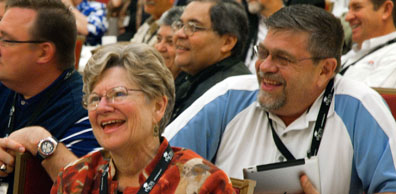
 CHARLESTON—The gauntlet was thrown down to Catholic educators at their annual conference held in Charleston recently. They were told in no uncertain terms that times have changed and it is time to change with them.
CHARLESTON—The gauntlet was thrown down to Catholic educators at their annual conference held in Charleston recently. They were told in no uncertain terms that times have changed and it is time to change with them.
Called “Awakening Possibilities,” the meeting of the 2011 National Catholic Education Association Chief Administrators of Catholic Education was an eye-opening event.
About 300 school leaders from across the nation attended the conference at the Charleston Marriott Hotel Oct. 23-26. There, they heard a variety of speakers on all the new possibilities in education today, and how they can move their schools from outdated to cutting edge.
On hand from the Diocese of Charleston were Interim Superintendents Jacqualine Kasprowski and Sister Canice Adams, SSCM, and Sandra Leatherwood, assistant to the superintendents.
Kasprowski, who is also principal of Cardinal Newman School in Columbia, said she is eager to share what they learned with her fellow principals and teachers.
“We all want to make Catholic education as strong as it can possibly be,” she said.
Some of the conference standouts for her were the two keynote speakers and a session on restructuring the theology curriculum, which diocesan high schools are doing now.
The new structure will take what was a bit disjointed in terms of teaching theology and change it into a flowing, Christ-centered model, Kasprowski said.
Other possibilities mentioned at the conference involve ways to meet the needs of 21st century children, such as employing modern technology as teaching tools instead of outdated textbooks.
“Our kids have to time-travel backward to go to school,” said Heidi Hayes Jacobs, one of the keynote speakers. “We aren’t preparing them for five-10-15 years down the road; we’re preparing them for 1985.”
She noted that textbooks are dated before they’re even published.
“They’re learning material from five years ago. Are you kidding me? Try five minutes ago,” she exclaimed.
Jacobs said schools must embrace digital tools such as webinars, podcasts and Skype in their curriculum, and her group can help schools upgrade gradually and realistically.
Another area that Kasprowski found compelling centered on the current school schedule, which was implemented in the 1800s when children had to be home to help with farm chores.
She said other dioceses have implemented changes to their hours and days based on merit studies and data that show adolescents don’t learn well in the early morning.
Successful changes at other schools include later start times for middle and high schools, and a switch to a year-round program that would have nine weeks on, three weeks off.
Of course, a lot of factors go into making changes on any level, and Kasprowski said they won’t be making any snap decisions.
 Instead, they will follow the lead of Father Joseph P. Tedesco and introduce the diocese to a plethora of possibilities, then find the best answers.
Instead, they will follow the lead of Father Joseph P. Tedesco and introduce the diocese to a plethora of possibilities, then find the best answers.
Father Tedesco was the introductory keynote speaker. He said when he was growing up he either wanted to be a doctor or a comedian. Instead, he was called to the priesthood, so he decided to be “a funny priest.”
During his opening session, Father Tedesco used humor to underscore some serious points about the role of teachers in today’s world. He said his job was to present the questions; the answers would be found throughout the rest of the conference.
“I want to give you a lot of new ways to look at things and challenge you to find ways to meet them,” he told the crowd.
Father Tedesco earned a master’s in sports psychology. His talk focused on the relationship of religion to sport and how Catholic educators can use the elements of mental toughness to develop courage and confidence in their charges.
Depending on their interests, administrators could attend sessions on everything from marketing and enrollment to case law updates.
Of course, camaraderie and socializing are also a big draw.
Immaculate Heart of Mary Sister Jane Herb, president of CACE, said she liked Father Tedesco’s comment about believing that God believes in us, and hopes everyone takes it to heart.
“The Gospel message is the same as it was 2,000 years ago, but the audience is different,” Sister Jane said. “I hope they go back renewed and refreshed for this challenging ministry.”
